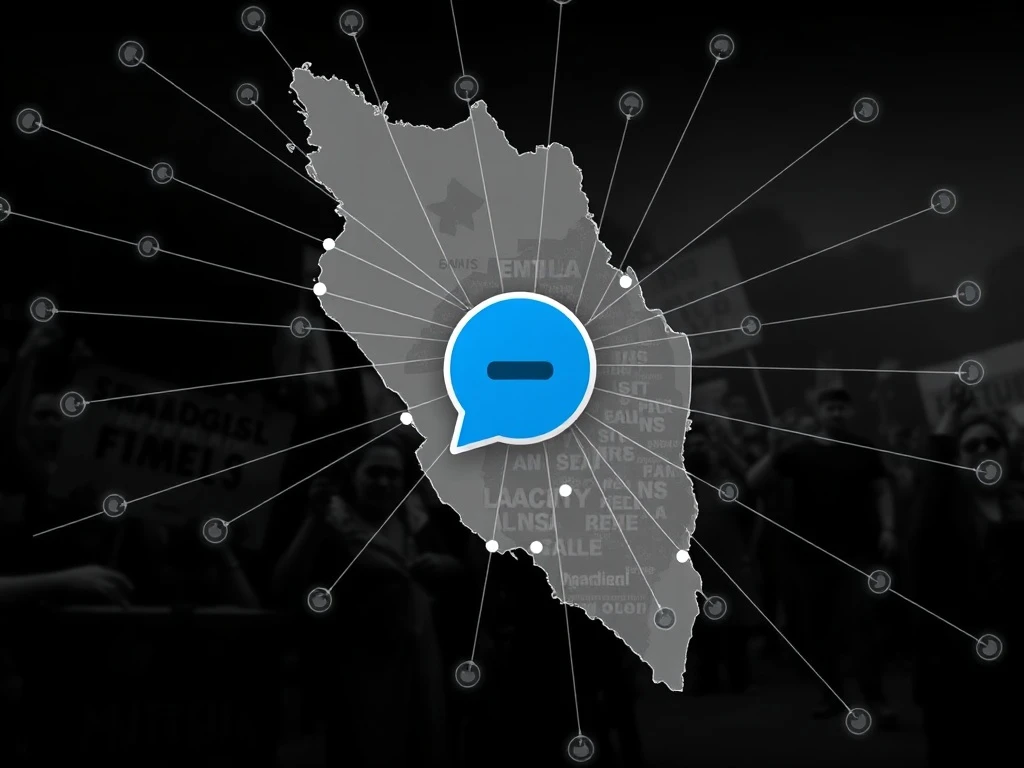Bitchat: Crucial Tool Surges in Madagascar Amidst Protests

In an increasingly connected yet often controlled world, decentralized communication platforms offer a crucial alternative. When traditional services face disruptions or censorship, tools like Bitchat provide a vital lifeline. This phenomenon is now evident in Madagascar, where **Bitchat** downloads and searches have spiked dramatically. Citizens are turning to this innovative service amidst widespread protests, seeking reliable and private ways to connect.
Bitchat Downloads Surge Amidst Madagascar Protests
Madagascar’s capital, Antananarivo, experienced significant unrest last Thursday. Protests erupted over persistent water and power cuts. These demonstrations quickly spread nationwide. Consequently, **Bitchat** has seen a notable surge in user interest across the African island nation. This follows similar upticks observed during recent civil unrest in Nepal and Indonesia.
Callebtc, a Bitcoin open-source developer working on the messaging service, confirmed the trend. On Sunday, he stated, “Bitchat downloads spiking in Madagascar.” He supported this claim with screenshots of protest news coverage. While specific download numbers from Madagascar remain undisclosed, Google Trends data offers compelling evidence. Searches for “Bitchat” in Madagascar soared from 0 to 100 on Friday, marking "peak popularity" within a 90-day period. Antananarivo, the capital, showed particular interest.
Furthermore, related search phrases like “Bitchat download” and “how to use Bitchat” became top five queries. Google categorized these as “breakout” terms. This indicates a "tremendous increase" in search activity. Global statistics from Chrome-Stats reveal that Bitchat has accumulated 365,307 downloads since its launch. Over 21,000 of these occurred in the last day, and more than 71,000 within the past week. However, these global figures do not specify regional distribution.
A Lifeline During Unrest: Decentralized Messaging in Crisis
The **Madagascar protests** began due to severe water and power shortages. Demonstrations in Antananarivo led to clashes with police and reports of looting. The energy minister was subsequently dismissed. Authorities responded by imposing a dusk-to-dawn curfew to prevent further unrest. Despite these measures, protests continued on Friday and Saturday across the country.
This situation mirrors events in other nations. Weeks prior, Nepal saw a surge in Bitchat downloads. This occurred amidst violent protests over corruption. A brief social media ban forced protestors to find new communication methods. Similarly, Indonesia experienced a download uptick during its own corruption-related protests. Such events highlight the critical role of **decentralized messaging** platforms. They offer resilient communication channels when traditional systems are compromised or censored.
Jack Dorsey’s Vision for Encrypted Communication
**Jack Dorsey**, Block CEO and Twitter co-founder, launched a beta for Bitchat in July. His vision was clear: to create a truly decentralized peer-to-peer messaging service. Bitchat leverages Bluetooth mesh networks. This allows for internet-free, encrypted communication. The service’s white paper outlines its core principles. It operates without central servers, accounts, email addresses, or phone numbers. This design ensures no infrastructure dependencies.
This architecture is particularly vital in regions with limited internet access. DataReportal, a global technology data platform, estimates Madagascar’s population at nearly 32 million. Yet, only 6.6 million people had internet access at the start of 2025. Over 18 million mobile connections existed in early 2025. However, many of these only supported voice and SMS services. Therefore, Bitchat’s ability to function offline becomes a game-changer for many Malagasy citizens. It offers a crucial tool for **encrypted communication** beyond state control.
The Global Debate: Privacy vs. Regulation
While **decentralized messaging** gains traction, it also faces increasing scrutiny. The European Union is currently pursuing a “Chat Control” law. This proposal aims to undermine encrypted messaging. It would require services like Telegram, WhatsApp, and Signal to screen messages before encryption. Fifteen EU countries currently support this controversial proposal. However, it still lacks the 65% population threshold for passage. Germany, holding a pivotal vote, has not yet finalized its stance.
Crypto advocates express concerns about this legislation. Diode CEO Hans Rempel and Brickken’s Elisenda Fabrega suggest it could drive users towards Web3 platforms. These platforms are inherently designed for privacy. Ultimately, the debate highlights a fundamental conflict. It pits the desire for secure, private communication against governmental oversight. Platforms like Bitchat represent a significant step in empowering individuals with greater communication autonomy.
The spike in **Bitchat** activity in Madagascar underscores a global trend. Citizens in times of crisis seek secure and uncensored communication. **Jack Dorsey**’s decentralized messaging service provides an answer. It offers **encrypted communication** that operates beyond traditional infrastructure. As governments worldwide consider tighter digital controls, the demand for such resilient tools will likely grow. **Decentralized messaging** platforms are becoming essential for maintaining freedom of expression and coordination during unrest.







